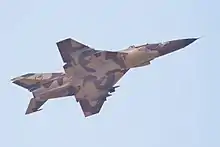Guizhou JL-9
The Guizhou JL-9, also known as the FTC-2000 Mountain Eagle (Chinese: 山鹰; pinyin: Shānyīng), is a family of two-seat supersonic advanced jet trainer and light combat aircraft developed by the Guizhou Aviation Industry Import/Export Company (GAIEC) for the People's Liberation Army Air Force (PLAAF) and the People's Liberation Army Naval Air Force (PLANAF).[1]
| JL-9 | |
|---|---|
 | |
| Role | Advanced jet trainer Light combat aircraft |
| Manufacturer | Guizhou Aviation Industry Import/Export Company (GAIEC) |
| Designer | Aero Engine Research Institute of Guizhou Aviation Industry Corporation |
| First flight | 13 December 2003 |
| Status | In service |
| Primary user | People's Liberation Army Air Force |
| Developed from | Chengdu JJ-7 |
Development

The FTC-2000 started as a GAIEC private venture to develop an inexpensive trainer for fourth generation aircraft. The trainer was revealed at the 2001 China International Aviation & Aerospace Exhibition.[2] The aircraft are reported to be produced at a GAIC assembly line in Anshun, Guizhou.[3]
The FTC-2000, as the JL-9, competed with the Hongdu JL-10 to meet the advanced trainer requirements of the PLAAF and PLANAF. The JL-10 is more technologically advanced, but also more expensive, than the JL-9. In 2013, both had entered production.[4]
A carrier-landing trainer variant was revealed by Chinese state media in 2011.[4] Designated the JL-9G, it has strengthened undercarriage, enlarged wing and diverterless supersonic inlets, but has proved to be unsuitable for arrested landings and is limited to land-based operations.[5]
On 5 September 2018, Chinese state-run Xinhua News Agency reported that GAIC had begun mass production of the FTC-2000G variant.[6] On 28 September, it was reported that the first mass-produced FTC-2000G performed its maiden flight.[7][8] In April 2020, China reported that an unnamed South-East Asian country had placed an order for the FTC-2000G, with deliveries expected between 2021 and 2023.[9] Later it was confirmed that Myanmar had ordered those jets.[10]
Design

The FTC-2000 is developed from the JJ-7/FT-7, the two seat trainer version of the Chengdu J-7; the Chengdu J-7 is a Chinese variant of the MiG-21. The FTC-2000 uses a new wing, a forward fuselage with side air intakes, and a glass cockpit; the engine, empennage, and mechanical controls of the JJ-7/FT-7 are retained.[2]
Operational history
.jpg.webp)
In 2014, the PLANAF had a regiment of JL-9s.[11] However, it was not until October 18, 2015, that the PLAAF started using the JL-9 for training purposes.[12]
In April 2023, the Rapid Support Forces of Sudan launched an attack on Merowe Air Base, destroying one Sudanese FTC-2000 while capturing the base.[13] Satellite imagery has revealed that three more FTC-2000s were present at the base at the time.[13]
Variants
- FTC-2000: Original model and export designation.
- FTC-2000G: The FTC-2000G is a dual seat light combat aircraft/lead-in fighter trainer.[14] It is one of the cheapest light fighters on the market with the aim to replace old legacy fighters like the J-7/F-7 and Mig-21. It has 7 hardpoints.[15] It also features a diverterless supersonic inlet.[16] It made its first flight in September 2018.[17] Compared to the FTC-2000 trainer variant, the FTC-2000G is heavier,[15] has a maximum speed of only Mach 1.2[14] due to a new wing design,[16][18] and has less endurance[15] than the FTC-2000. The aircraft can carry a maximum of 3 tons of weaponry.[14]
- JL-9: Initial PLA variant.
- JL-9G: PLANAF carrier-trainer variant.[19] It is a modified JL-9 for aircraft carrier training. It is designed for ski-jump ramp takeoffs and simulated arrested landings (land-based).[20] and includes a tailhook.[20]
Operators
Current operators
 People's Republic of China
People's Republic of China
- People's Liberation Army Air Force - 30 JL-9[21]
- People's Liberation Army Naval Air Force - 28 JL-9, 12 JL-9G[22]
 Myanmar
Myanmar
- Myanmar Air Force — six delivered (unknown number ordered)[23][24]
 Sudan
Sudan
- Sudanese Air Force — five[25]
Specifications (FTC-2000)
General characteristics
- Fuel capacity: 2,000 kg (4,409 lb) internal + up to 1,302 kg (2,870 lb) in external tanks
(1 × WP-14C Kunlun-3 for FTC-2000G, 53.89 kN (12,110 lbf) thrust dry and 76.53 kN (17,200 lbf) with afterburner.)
Performance
- Endurance: 3 hours
- g limits: +8 -3
- Thrust/weight: 0.00645 kN/kg (0.658 lbf/lb)
- Take-off run: 400–500 m (1,312–1,640 ft)
- Landing run: 700 m (2,297 ft)
Armament
- Guns: 1x 23mm cannon[12]
- Hardpoints: 5 with a capacity of 2,000 kg (4,409 lb) maximum, with provisions to carry combinations of:
- Other: up to 3 x fuel tanks[12]
- Missiles:
Avionics
- Pulse Doppler radar
- comms
- IFF
- Transponder
- EFIS
- HOTAS
- GPS / INS
See also
Related development
Aircraft of comparable role, configuration, and era
- Hongdu JL-10
- BAE Systems Hawk
- Alenia Aermacchi M-346 Master
- Aero L-159 Alca
- KAI T-50 Golden Eagle
- Yakovlev Yak-130
- HAL HJT-36 Sitara
References
![]() Media related to Guizhou JL-9 at Wikimedia Commons
Media related to Guizhou JL-9 at Wikimedia Commons
- Jackson, Paul, ed. (2010). Jane's All the World's Aircraft 2010-11 (101st ed.). London: Jane's Information Group. pp. 116–117. ISBN 978-0710629166.
- Fisher, Richard D., Jr (18 June 2015). "Paris Air Show 2015: China close to first FTC-2000 supersonic trainer sale in Africa". IHS Jane's 360. Archived from the original on 21 June 2015. Retrieved 29 July 2016.
{{cite web}}: CS1 maint: multiple names: authors list (link) - Grevatt, Jon (June 6, 2017). "China promotes FTC-2000 trainer for export". Jane's Information Group. Archived from the original on June 6, 2017. Retrieved June 7, 2017.
Commenting on the development, the State Administration of Science, Technology, and Industry for National Defense (SASTIND) – the agency responsible for Chinese defence industrial development – said the aircraft represented the first export aircraft produced at GAIC's assembly line in city of Anshun in Guizhou province.
- Caffrey, Craig (2013). Aiming high: China's air ambitions (PDF) (Report). Jane's Information Group. p. 5. Archived (PDF) from the original on 24 January 2017. Retrieved 29 July 2016.
- Rupprecht, Andreas (March 2018). "China: Naval Aviation Training". Air International. pp. 46–49. ISSN 0306-5634.
- Dominguez, Gabriel (6 September 2018). "China begins series-producing FTC-2000G aircraft". IHS Jane's 360. London. Archived from the original on 7 September 2018. Retrieved 7 September 2018.
- Waldron, Greg (1 October 2018). "FTC-2000G conducts maiden flight". FlightGlobal. Singapore. Archived from the original on 6 October 2018. Retrieved 6 October 2018.
- Dominguez, Gabriel (28 September 2018). "China's first series-produced FTC-2000G makes maiden flight". IHS Jane's 360. Archived from the original on 6 October 2018. Retrieved 6 October 2018.
- Waldron, Greg (20 April 2020). "AVIC FTC-2000G snags first export order". FlightGlobal. Retrieved 20 April 2020.
- Irrawaddy, The (2022-12-05). "Myanmar Junta Takes Delivery of FTC-2000G Fighter Jets from China". The Irrawaddy. Retrieved 2023-07-19.
- International Institute for Strategic Studies (2014). Hacket, James (ed.). The Military Balance 2014. Oxfordshire: Routledge. p. 235. ISBN 978-1-85743-722-5.
- Waldron, Greg (29 October 2015). "Chinese cadets start using JL-9 advanced jet trainer". Flight International. Archived from the original on 18 August 2016. Retrieved 29 July 2016.
- Rogoway, Sim Tack, Tyler (2023-04-17). "Egyptian MiG-29s Destroyed In Sudan". The Drive. Retrieved 2023-04-18.
{{cite web}}: CS1 maint: multiple names: authors list (link) - "Is Cambodia the Mystery Buyer of China's FTC-2000G Trainer/Fighter Jet?". Defense World. Retrieved 14 February 2020.
- wminnick (20 November 2012). "China's FTC-2000 Upgraded". Defense News. Archived from the original on 26 December 2014. Retrieved 29 July 2016.
- "FTC-2000 G". Aviation Industry Corporation of China. Archived from the original on 29 August 2016. Retrieved 29 July 2016.
- "China's FTC-2000G fighter aircraft conducts maiden flight". Air Force Technology. October 2018. Archived from the original on 19 October 2018. Retrieved 19 October 2018.
- "FTC-2000". Aviation Industry Corporation of China. Archived from the original on 29 August 2016. Retrieved 29 July 2016.
- NEWS - Asia & Australasia, Air International, August 2011, p. 16.
- COVERT AFFAIR A. Mladenov, Air International, March 2013, p. 93
- The Military Balance 2021. International Institute for Strategic Studies. p. 255.
- The Military Balance 2021. International Institute for Strategic Studies. p. 254.
- "Myanmar Regime Buys FTC-2000G Fighter Jets From China". The Irrawaddy. 2022-10-18. Retrieved 2022-10-19.
- Beech, Anthony Davis (8 December 2022). "Myanmar Air Force inducts new FTC-2000Gs". Janes Defence – via janes.com.
- Binnie, Jeremy (16 May 2018). "Sudan's new FTC-2000 jets arrive". IHS Jane's 360. Archived from the original on 17 May 2018. Retrieved 16 May 2018.